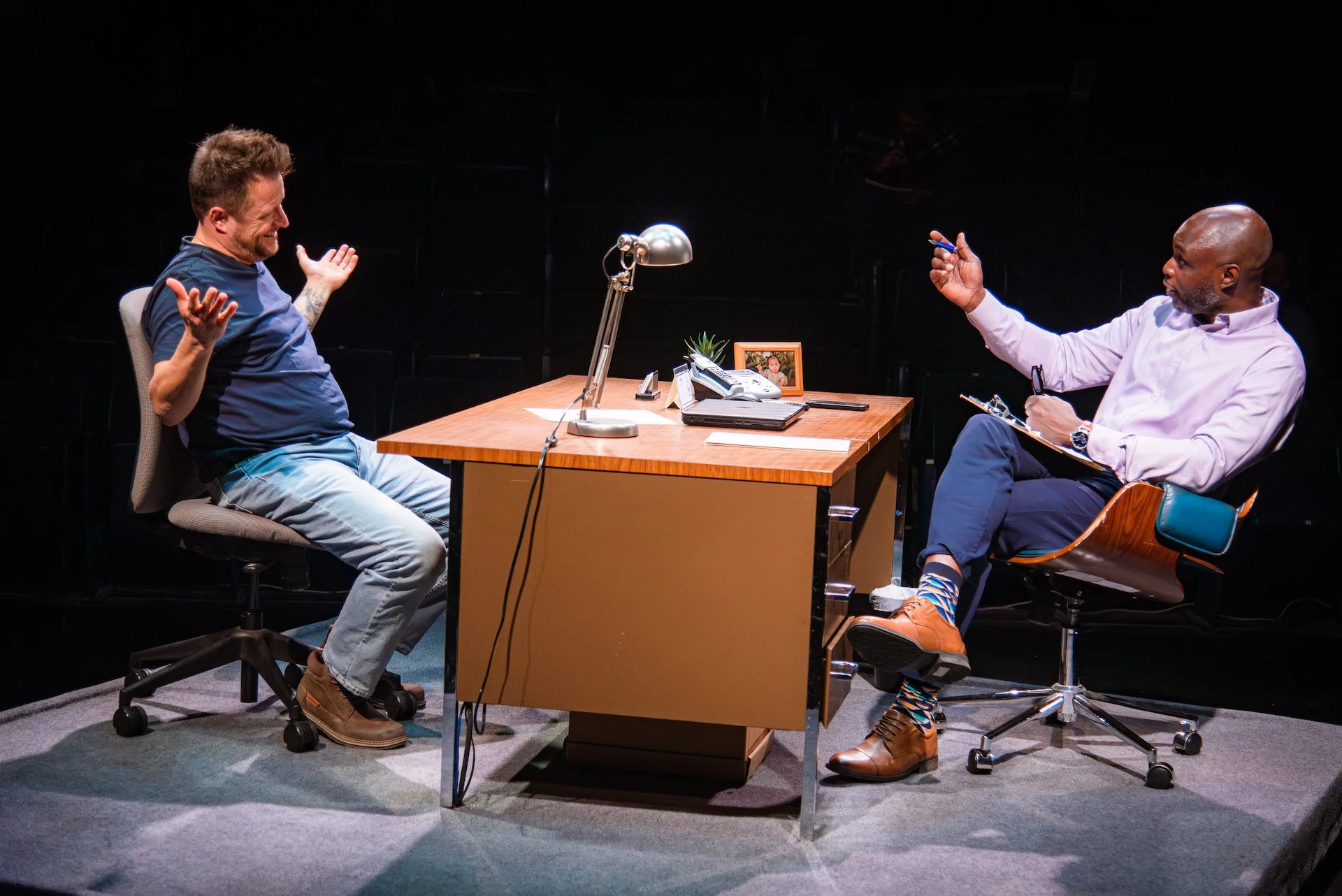Theatre review: A Case for the Existence of God comes alive with witty and honest back-and-forths
Rather than engaging in overt discussions about a higher entity, two fathers find nuanced hope in heartbreaking situations, in Pacific Theatre production
Rob Salvador and Kwesi Ameya in A Case for the Existence of God. Photo by Chelsea Stuyt
Pacific Theatre presents A Case for the Existence Of God until June 9
PRESENTED BY PACIFIC Theatre and directed by Kaitlin Williams, Samuel D. Hunter’s A Case for the Existence of God counters societal oppression with an unlikely friendship and infinite paternal love.
The case begins in a cramped cubicle, in a meeting between two men with contrasting personalities but the same intrinsic goal: to be a good father to their daughters.
Keith (Kwesi Ameyaw), a by-the-book mortgage broker who has a degree in English and Early Music, hopes to finalize his adoption for Willa, his foster daughter. Meanwhile, the idealistic but passionate Ryan (Rob Salvador) works in a yogurt plant and seeks a loan for 12 acres of land to rebuild a burned-down family house in Idaho, for his daughter, Krista. However, they are disadvantaged by a complex late-capitalist society rife with marginalization and oppression, as Keith is an unmarried queer Black man, while Ryan is barely making ends meet, and a child of divorced parents who struggled with addiction.
Despite their initial business consultations after meeting at their daughters’ daycare, their friendship blossoms when they connect as fathers—bragging about Willa or Krista’s first swims, sleep schedules, and eventually introducing the children to play in the park together.
While the play is focused mostly in one location with minimal movement of set pieces, Ameyaw and Salvador bring excellent nuance and energy to their roles, in the script’s witty and honest back-and-forths. The “polyphony” in their rhythms of speech, as well as harmonic variations in their characters’ distinct approaches to life, connected audiences to a yearning for more “permanent” moments in life. At the same time, laughter filled the air on opening night at Keith’s love of motets or Ryan’s confusion of mortgage broker jargon..
The space was used extremely effectively, brought to life by Alaia Hamer’s design of the austere office and watercoloured sunsets. Monica Emme’s props and Jennifer Milley’s costume designs hinted at character from the outset, while Hina Nishioka’s soft lighting created differences in time and space, paired with apt sound design by Rick Colhoun.
A prominent theme of the play is the life money and circumstance can provide for children. Should adoption or custody be determined by who can afford to provide for them, despite an overwhelming love for the child? Ryan’s vision of buying land for his daughter’s future can feel unrealistic, given his circumstances—but why have we arrived at a point where we scoff at his dream?
The title in relation to the play is a matter of much debate. Rather than overt discussions, the case, the case for an existence of a higher entity is only subtly mentioned by the characters:
“What’s above Idaho?”
“What is up there?”
[…] “Nothing, there’s nothing.”
While initially the conclusion of the play feels a little too idealistic, upon reflection, perhaps the case for the existence of God isn’t an argument, but an investigation in which ordinary people search to find faith in heartbreaking situations. The play effectively nudges us into these questions without forcing a heavy hand. What else can people like Keith and Ryan—caught in the throes of late-stage capitalism do—if not by hoping for an unlikely dream to manifest? Still, as long as we keep searching for community, perhaps we will find an answer that brushes against the future we hope our children will achieve. ![]()













